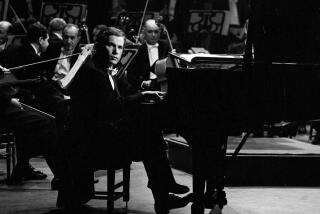* Friedrich Gulda; Eccentric Pianist, Composer
- Share via
Friedrich Gulda, 69, one of Austria’s foremost classical and jazz pianists and a composer known for his eccentricity. Gulda was born in Vienna in 1930 and began piano studies when he was 7. He entered the Vienna Music Academy at 12 and won a major prize--first place in the Geneva International Music Festival--when he was 16. With an intellectual approach to Bach, Beethoven and Mozart, he quickly achieved international renown in tours of Europe and South America in 1949 and a much-heralded Carnegie Hall debut in 1950. Jazz changed his direction in 1951, when, after an appearance with the Chicago Symphony, he joined jazz master Dizzy Gillespie in an improvisation. Jazz, he once told the New York Times, offered “the rhythmic drive, the risk, the absolute contrast to the pale, academic approach I had been taught.” In 1956, he made his American jazz debut at New York’s Birdland, then took part in the Newport Festival. He founded a jazz combo and a big band called Eurojazz Orchestra. He began to mix jazz and classical pieces in his performances, launched a modern jazz competition in Vienna in 1966 and gave improvisation recitals. In 1970, he accepted the Beethoven Ring from the Vienna Academy but later returned it as a protest against an educational system he found too stifling. In 1988, he abruptly canceled his performances at the Salzburg music festival after traditionalists objected to his inclusion of a jazz virtuoso, Joe Zawinul, in one of his programs. Last year he faked his own obituary, just days before he was to play Mozart at a rare classical appearance in Salzburg. The title of that program was “Resurrection Party.” On Thursday of an apparent heart attack in Vienna.
More to Read
The biggest entertainment stories
Get our big stories about Hollywood, film, television, music, arts, culture and more right in your inbox as soon as they publish.
You may occasionally receive promotional content from the Los Angeles Times.










